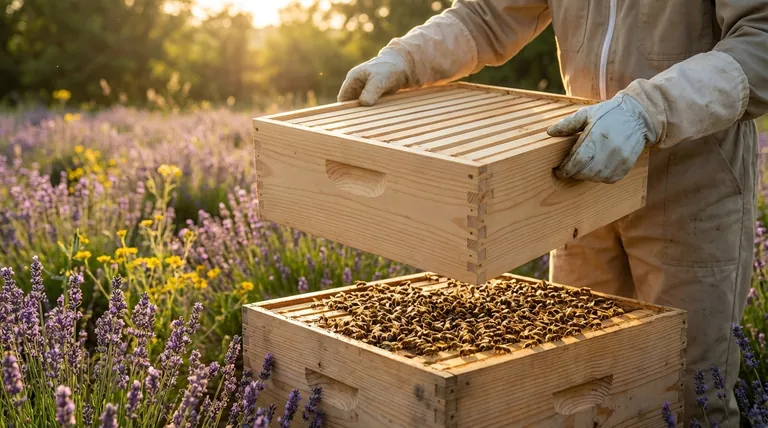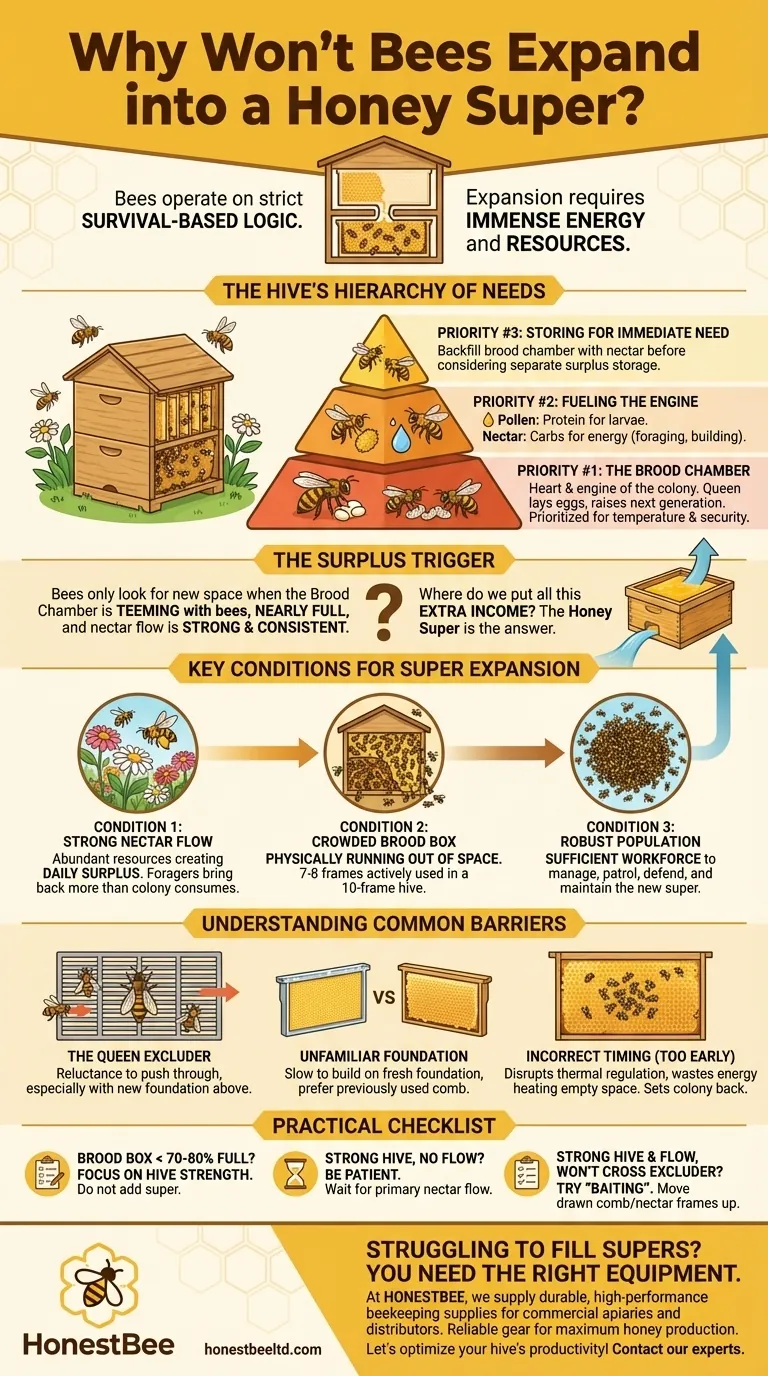At its core, a honeybee colony will not expand into a honey super because it operates on a strict survival-based logic. Expansion requires an immense investment of energy and resources, and bees will only commit to this effort when two critical conditions are met: the existing hive is packed with bees and brood, and there is a strong, external nectar flow that provides a surplus beyond their immediate needs.
A honey super represents surplus storage. Bees will not build out or fill a surplus space until their primary living and breeding quarters—the brood box—are completely full and they have access to abundant external resources to justify the expansion.

The Hive's Hierarchy of Needs
To understand why bees are reluctant to move up, you must think of the hive as a single organism focused on survival and reproduction. It follows a strict hierarchy of needs, and the honey super is low on that list.
Priority #1: The Brood Chamber
The brood chamber is the heart and engine of the colony. It is where the queen lays her eggs and where the next generation of bees is raised. The colony will always prioritize maintaining the optimal temperature, security, and resource levels within this core area.
Priority #2: Fueling the Engine
Raising brood and maintaining the hive requires constant resources. Pollen serves as the protein source to feed developing larvae, while nectar provides the carbohydrates (energy) for the adult bees to perform all their tasks, from foraging to comb building.
Priority #3: Storing for Immediate Need
Before considering a separate surplus storage area, bees will "backfill" any empty cells in the brood chamber with nectar. If you see nectar being stored in the brood nest around the eggs and larvae, it's a sign that a flow is on, but the bees have not yet committed to moving it upstairs.
The Surplus Trigger
Only when the brood chamber is teeming with bees, nearly all cells are occupied with brood, pollen, or nectar, and the nectar flow is strong and consistent will the bees look for new space. The honey super is the answer to the question, "Where do we put all this extra income?"
Key Conditions for Super Expansion
Before adding a honey super, or to diagnose why bees aren't using one, verify these three conditions are met.
Condition 1: A Strong Nectar Flow
This is the single most important external signal. A few flowers are not enough. A true nectar flow means that resources are so abundant that foragers are returning to the hive with more nectar than the colony consumes daily. Bees can sense this and will prepare for storage.
Condition 2: A Crowded Brood Box
The hive must be physically running out of space. A common rule of thumb for a standard 10-frame Langstroth hive is that the bees should be actively using at least 7 to 8 of the frames. This state, often called "bursting at the seams," creates the necessary pressure to expand upwards.
Condition 3: A Robust Population
A small workforce cannot manage a larger home. The colony needs enough bees to not only forage for surplus nectar but also to patrol, defend, and maintain the temperature and humidity in the expanded area of the super. A weak hive given a super too early will ignore it or waste energy trying to heat the empty, cavernous space.
Understanding Common Barriers
If the conditions above seem to be met but the bees still won't move up, investigate these common physical and logistical barriers.
The Queen Excluder
A queen excluder is a grate with slots wide enough for worker bees but too narrow for the queen. While effective, it can act as a significant barrier. Bees can be hesitant to push through it, especially if the foundation in the super above is new and undrawn.
Unfamiliar Foundation
Bees are far more likely to work on comb that has been previously used. They can be slow to build out fresh foundation, particularly smooth plastic foundation. This hesitation is compounded when that new foundation is on the other side of a queen excluder.
Incorrect Timing (Adding the Super Too Early)
Giving the bees extra space before they are ready is a common mistake. It can disrupt the thermal regulation of the brood nest, forcing the bees to expend energy heating an empty box instead of raising brood and gathering resources. This sets the entire colony back.
A Practical Checklist for Your Hive
Use this guide to decide your next move based on your hive's specific situation.
- If your brood box is not 70-80% full: Your primary focus is hive strength. Do not add a super. Let the colony build its population and fill out the brood chamber first.
- If your hive is strong but there is no major nectar flow: Be patient. Adding a super now will only give them more space to heat. Wait for the primary nectar flow in your area to begin.
- If your hive is strong and a flow is on, but they won't cross the excluder: Try "baiting" the super. Move one or two frames of drawn-out comb or open nectar from the brood box up into the super to entice them upwards.
Ultimately, successful honey production comes from working with the bees' natural instincts, not against them.
Summary Table:
| Condition for Super Expansion | Key Indicator |
|---|---|
| Strong Nectar Flow | Abundant resources creating a daily surplus. |
| Crowded Brood Box | Bees actively using 7-8 frames in a 10-frame box. |
| Robust Population | Sufficient workforce to manage and defend the new space. |
Struggling to get your bees to fill your supers? You need the right equipment to support your colony's natural expansion. At HONESTBEE, we supply durable, high-performance beekeeping supplies and equipment designed for commercial apiaries and distributors. Our wholesale-focused operations ensure you get the reliable gear you need to maximize honey production. Let’s optimize your hive's productivity together—contact our experts today for a consultation!
Visual Guide

Related Products
- Langstroth Honey Bee Box Hive Boxes for Different Depths
- Professional 500g Sectional Comb Honey Frame System for Beekeeping
- Automatic Heat Preservation 6 Frame Pro Nuc Box for Honey Bee Queen Mating
- Economy Small Scale Honey Dryer Dehumidifier Thickening Machine
- Portable Bee Mating Hive Boxes Mini Mating Nucs 8 Frames for Queen Rearing
People Also Ask
- How should hive boxes be aligned after reassembly? Ensure a Perfect Seal for Hive Health
- What is a hive body in a Langstroth hive? Essential Guide to Brood Chambers and Standard Dimensions
- What are the sizes available for Langstroth boxes? A Guide to 8-Frame vs. 10-Frame & Depths
- What are the primary functions of multi-layer beehives and standard 235 x 230 mm frames in professional apiaries?
- How deep is a medium bee box? Unlock the Key to a Versatile and Manageable Hive



















